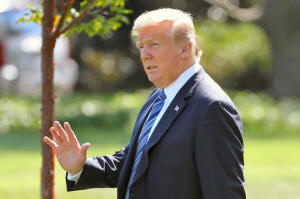|
Trump ups ante on China, threatens duties
on nearly all its imports
 Send a link to a friend
Send a link to a friend
 [September 08, 2018]
By Steve Holland and David Lawder [September 08, 2018]
By Steve Holland and David Lawder
ABOARD AIR FORCE ONE/WASHINGTON (Reuters) -
U.S. President Donald Trump warned on Friday he was ready to slap
tariffs on virtually all Chinese imports into the United States,
threatening duties on another $267 billion of goods on top of $200
billion in imports primed for levies in coming days.
The moves would sharply escalate Trump's trade war with Beijing over his
demands for major changes in economic, trade and technology policy.
China has threatened retaliation, which could include action against
U.S. companies operating there.
Hours after a public comment period closed on his $200 billion China
tariff list, Trump told reporters aboard Air Force One that he was
"being strong on China because I have to be."
"The $200 billion we are talking about could take place very soon
depending on what happens with them. To a certain extent it's going to
be up to China," Trump said. "And I hate to say this, but behind that is
another $267 billion ready to go on short notice if I want. That totally
changes the equation."
Stock prices slipped after his comments, with the S&P 500 off 0.2
percent, while China's off-shore trade yuan currency fell against the
dollar. [MKTS/GLOB]
Trump has already imposed 25 percent tariffs on $50 billion worth of
Chinese goods, mostly industrial machinery and intermediate electronics
parts, including semiconductors.

The $200 billion list, which includes some consumer products such as
cameras and recording devices, luggage, handbags, tires and vacuum
cleaners, would be subject to tariffs of 10 percent to 25 percent.
Cell phones, the biggest U.S. import from China, have so far been
spared, but would be engulfed if Trump activates the $267 billion tariff
list.
Trump's threatened tariffs, now totaling $517 billion in Chinese goods,
would exceed the $505 billion in goods imported from China last year.
But 2018 imports from China through July were up nearly 9 percent over
the same period of 2017, according to U.S. Census Bureau data.
Earlier on Friday, White House economic adviser Larry Kudlow told
Bloomberg Television the administration would evaluate public comments
before making decisions on the $200 billion tariff list.
The U.S. Trade Representative's office received nearly 6,000 comments
and held seven days of public hearings on the proposed levies.
Most comments were from companies seeking to remove products from the
tariff list, arguing there were few, if any alternative sources and the
duties would cause financial hardship. Comparatively few applauded the
tariffs.
Major technology company Apple Inc said a "wide range" of its products
would be hit by the tariffs, but not its iPhone. It said in a late
submission that its AirPods headphones, some of Apple's Beats
headphones, and its new HomePod smart speaker would face levies, causing
its shares to slip in late trading.
[to top of second column]
|

President Donald Trump walks to Marine One while departing the White
House in Washington, U.S., September 6, 2018. REUTERS/Chris Wattie

"Our concern with these tariffs is that the U.S. will be hardest
hit, and that will result in lower U.S. growth and competitiveness
and higher prices for U.S. consumers," Apple said in the letter.
Retailers had successfully kept high-profile consumer electronics
such as cell phones and television sets off of previous tariff
lists. But David French, top lobbyist for the National Retail
Federation, whose members include Amazon.com , BJ’s Wholesale Club
and Macy’s, said nearly every consumer good could be affected if
Trump follows through on all threatened tariffs.
"The Chinese aren't paying these tariffs, American families are
going to pay these tariffs. These are taxes and they're going to
find their way into the pocket book of folks around the country,"
French said.
STILL TALKING TO CHINA
Kudlow, who heads the National Economic Council, told CNBC the
administration was still talking with China about trade issues but
so far China had not met U.S. requests.
The United States has demanded that China better protect American
intellectual property, cut its U.S. trade surplus, allow U.S.
companies greater access to its markets and roll back its
high-technology industrial subsidy programs.
"We are still talking with China on a number of issues ... Those
talks will continue to go on. We want lower (trade) barriers across
the board," Kudlow said.
Specifically, Kudlow said, the United States was seeking "zero
tariffs, zero non-tariff barriers, zero subsidies, stop the IP
theft, stop the technology transfer, allow Americans to own their
own companies."

"Those have been our asks for many months and so far those asks have
not been satisfied," he said. "However, hope springs eternal."
(Additional reporting by Susan Heavey; Writing by David Lawder and
Lisa Lisa Lambert; editing by David Gregorio and James Dalgleish)
[© 2018 Thomson Reuters. All rights
reserved.]
Copyright 2018 Reuters. All rights reserved. This material may not be published,
broadcast, rewritten or redistributed.
Thompson Reuters is solely responsible for this content. |